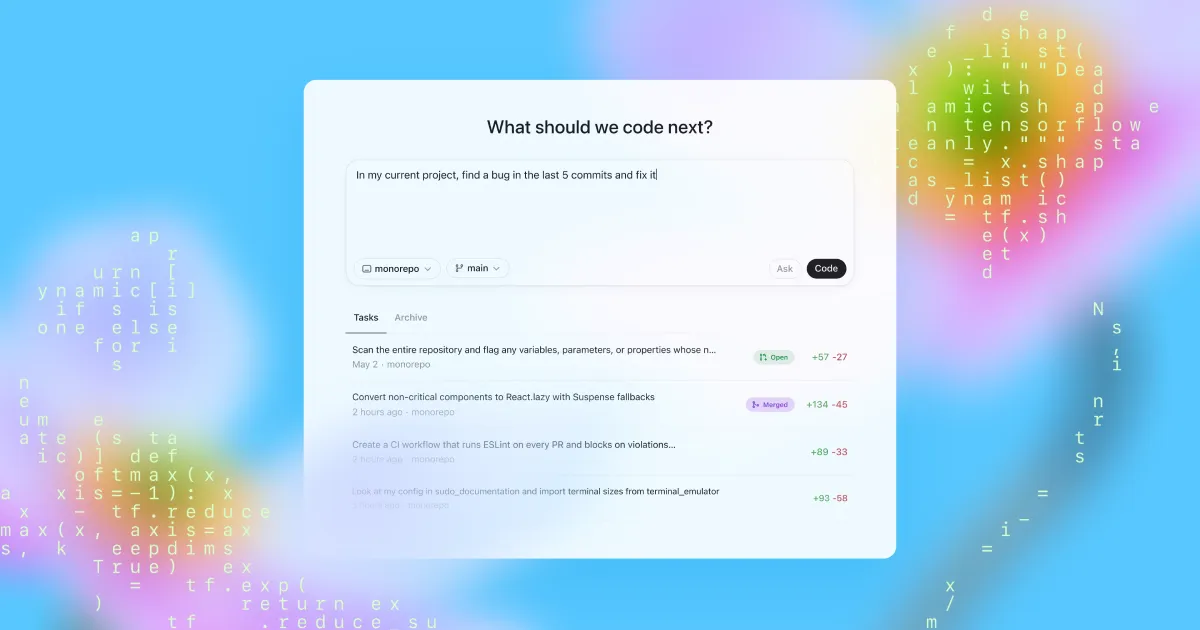OpenAI launches Codex, a web-based AI coding tool in ChatGPT

OpenAI has officially unveiled Codex, a research preview of its most advanced AI coding agent to date. Announced on Friday, the new tool is designed to accelerate and automate software development by handling a wide range of programming tasks — from writing features and fixing bugs to testing and codebase analysis.
Codex is powered by codex-1, a specialized version of OpenAI’s o3 AI model, optimized for software engineering. According to OpenAI, codex-1 produces “cleaner” and more instruction-compliant code than its predecessor. It can also independently run iterative tests until the code meets the required standards, allowing for greater reliability and automation in software development.
A Virtual AI Teammate in the Cloud
Codex runs in a sandboxed virtual environment hosted in the cloud, meaning it operates separately from a user’s local system. This allows it to interact safely with codebases, especially when integrated with GitHub, which lets Codex preload a user’s repositories.
OpenAI says Codex can handle multiple coding tasks simultaneously and won’t interfere with the user’s access to their local machine or browser. In practical terms, Codex can take as little as one minute or up to 30 minutes to complete tasks such as writing a new feature, resolving bugs, or explaining code.
Available Now for ChatGPT Subscribers
Starting immediately, Codex is available to users subscribed to ChatGPT Pro, Team, and Enterprise tiers. OpenAI promises “generous access” during the initial rollout, though rate limits will be introduced in the coming weeks. Users will then have the option to purchase additional usage credits.
The company also plans to extend access to ChatGPT Plus and Edu users soon.
Codex in Action
The tool is accessible via the ChatGPT interface, where users can assign tasks using the "Code" button or ask specific questions about their codebase through the "Ask" button. Codex maintains a task queue and tracks progress on ongoing tasks, making it functionally similar to a virtual pair programmer.
Josh Tobin, OpenAI’s Agents Research Lead, describes Codex as a potential “virtual teammate” — one capable of autonomously completing tasks that would typically take human engineers hours or even days. OpenAI is already using Codex internally to help with repetitive work, feature scaffolding, and documentation drafting.
Emphasis on Safety and Responsibility
OpenAI emphasizes that Codex was built with security in mind. It operates in an air-gapped environment, meaning it has no access to the broader internet or external APIs, which reduces the risk of malicious activity. Codex is also designed to refuse requests to generate harmful or malicious software.
However, OpenAI acknowledges the limitations of current AI coding tools. Like other generative models, Codex can make mistakes. A Microsoft study recently showed that even top-tier coding models still struggle with reliable debugging. Despite this, investor interest in AI coding platforms continues to surge.
Open Source CLI and Expanding Ecosystem
Alongside the main Codex agent, OpenAI is also upgrading Codex CLI, its open-source coding assistant for the terminal. The CLI now runs on a version of the o4-mini model, fine-tuned for software engineering, and available via API at competitive token rates.
Codex’s release is part of a broader effort by OpenAI to expand the ChatGPT platform with high-value tools. In the last year, the company has added access to Sora (video generation), Deep Research (research assistant), and Operator (web browsing agent), all aimed at enhancing the subscription offering.
The Bigger Picture
The race to dominate the AI coding space is heating up. Giants like Google and Microsoft report that around 30% of their code is now AI-generated, and competitors like Anthropic and Cursor are also making big moves. Cursor alone reportedly reached $300 million in annualized revenue and is seeking new funding at a $9 billion valuation.
In this context, OpenAI’s Codex launch — along with its recent $3 billion acquisition of Windsurf, another AI coding platform — signals a strong push to claim its share of this rapidly growing market.
As Codex rolls out to more users and continues to evolve, it could redefine how developers interact with code — transforming the way software is written, tested, and maintained.





